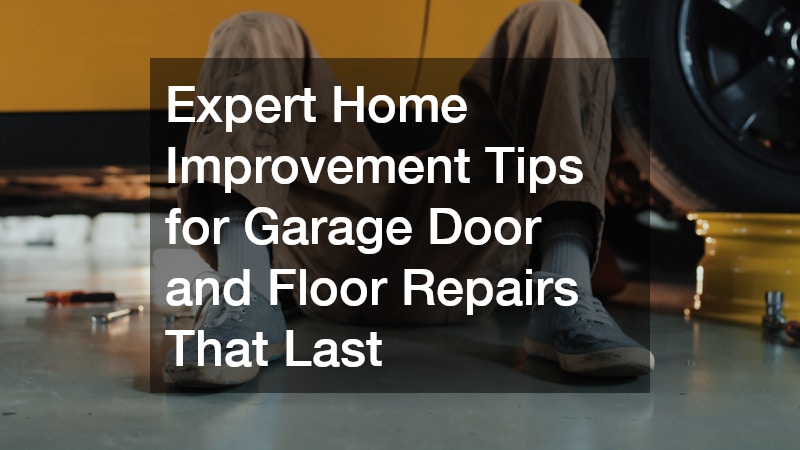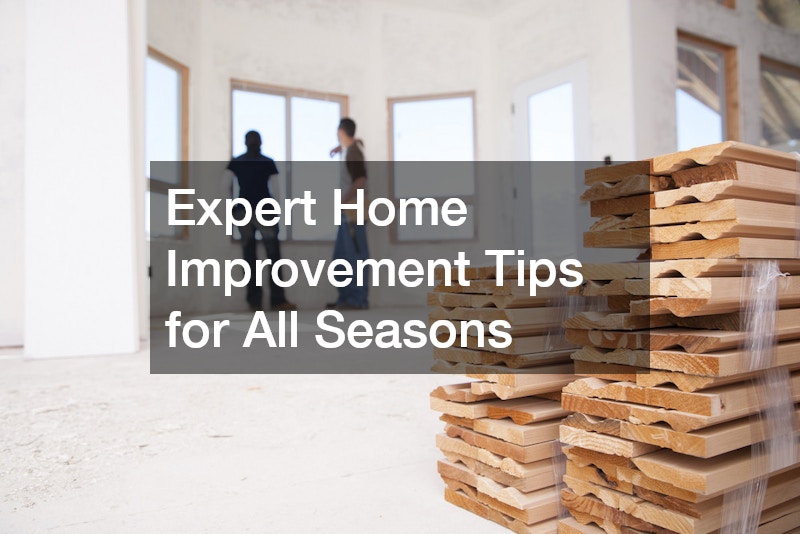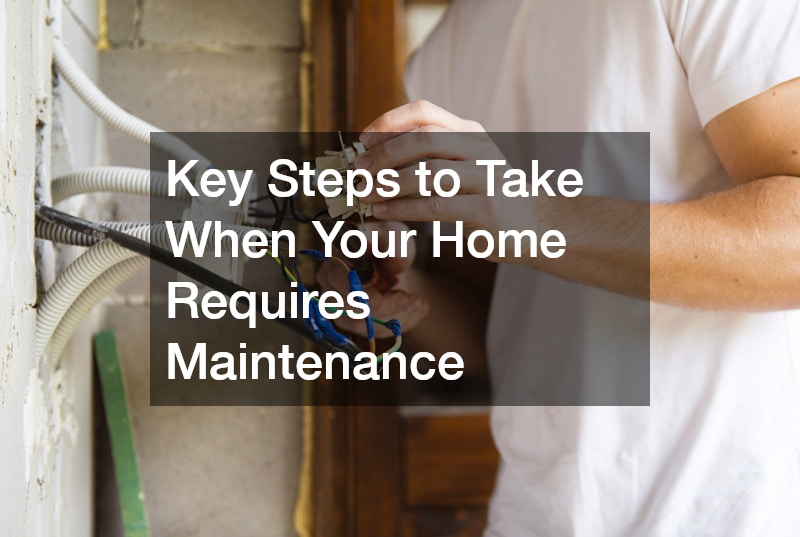Your garage may not be the most glamorous part of your home, but it plays a vital role in both convenience and curb appeal. From storing tools and vehicles to serving as a workshop or entry point, the garage endures a lot of wear and tear. Two key components that often require attention are the garage door and the floor. Addressing problems early and understanding proper maintenance can prevent small issues from becoming major headaches.
In this expert home improvement guide, we’ll explore how to keep your garage door functioning smoothly and your floors looking their best. Whether you’re dealing with cracked concrete or a noisy garage door opener, knowing how to spot problems—and what to do about them—can make all the difference. We’ll also help you understand when a simple repair will do and when it’s time to bring in local garage door installers or visit a local flooring store.
Expect practical advice, actionable tips, and insight into the best materials and tools to use for both garage doors and floors. Whether you’re planning a full makeover or simply trying to avoid costly repairs, this expert home improvement resource has you covered.
What Common Problems Do Garage Doors Face?
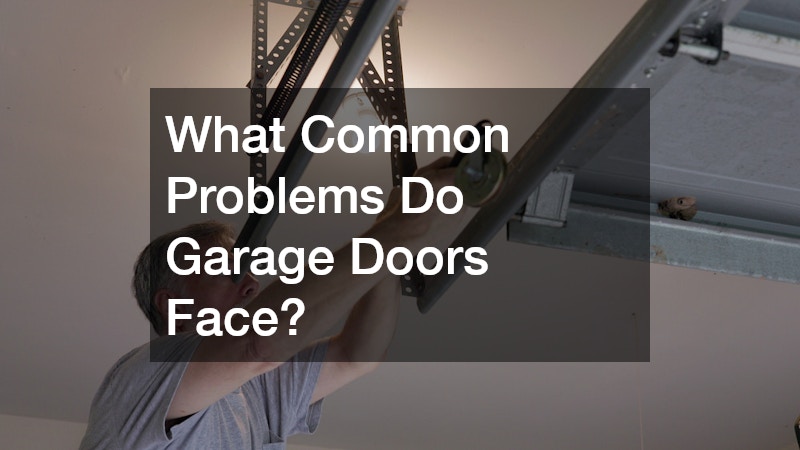
Malfunctioning Remote Control
Few things are more frustrating than hitting your garage door remote and getting no response. This issue can be caused by dead batteries, signal interference, or problems with the garage door opener itself. Start with the basics—replacing batteries or reprogramming the remote. If those fixes don’t work, it may be time to consult a garage door company for a more thorough inspection.
Noisy Operation
If your garage door groans, squeals, or rattles every time it moves, don’t ignore it. Noises can indicate loose hardware, worn rollers, or poor lubrication. Regular garage door maintenance—like tightening bolts and applying a silicone-based lubricant—can silence most issues. Persistent noise may signal a more complex mechanical problem, best handled by professionals from local garage door installers.
Misalignment Issues
A misaligned garage door won’t just look off—it can damage the track or even prevent the door from closing properly. Symptoms include uneven movement, gaps along the side, or difficulty opening. Realigning the door often involves adjusting the tracks and springs, tasks that are safest when done by experienced garage door companies.
How Can I Extend the Life of My Garage Door?
Regular Maintenance Tips
Just like any moving system in your home, garage doors benefit from regular upkeep. Visual inspections every few months can catch frayed cables, bent tracks, or rust. Make garage door maintenance a seasonal habit to avoid surprises.
Lubrication Techniques
Use silicone or lithium-based lubricants to treat rollers, hinges, and springs. Avoid grease—it attracts dirt. Proper lubrication not only quiets noisy operations but also reduces wear and tear, giving your garage door opener less resistance to push against.
Seasonal Care Guidelines
Weather impacts how your garage door functions. In colder months, rubber seals can become brittle, while heat may cause parts to expand and warp. Clean and inspect weatherstripping regularly, and tighten loose hardware after extreme weather to stay on top of seasonal damage.
What Should I Know About Garage Door Types?
Types of Garage Doors
Garage doors come in several styles, including sectional, roll-up, tilt-up, and side-hinged designs. Each has its benefits—sectionals are common for their durability, while roll-ups are great for tight spaces. Knowing your options helps with both repairs and replacements.
Material Comparisons
Steel doors are sturdy and low maintenance. Wood offers charm but requires upkeep. Aluminum is lightweight and resistant to rust, making it ideal in humid climates. When considering garage door replacement, material matters not just for function, but for aesthetics and energy efficiency too.
Choosing the Right Style for Your Home
Style contributes to curb appeal. A modern home may benefit from minimalist aluminum doors, while a craftsman-style house may look better with custom wood panels. Talk to garage door companies that offer design consultations to find the right fit.
How Do I Repair a Cracked Floor?
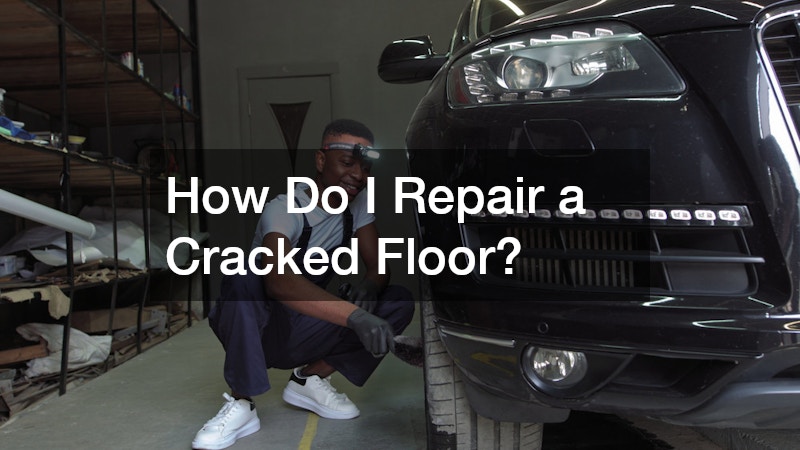
Identifying the Type of Crack
Not all cracks are created equal. Hairline cracks are typically cosmetic. Shrinkage cracks occur as concrete cures and are common in garage floor coatings. Structural cracks, however, are a red flag—they may indicate settling or water damage.
Repair Techniques
Start by cleaning the crack and removing any loose debris. Apply an epoxy floor patch or concrete filler based on the crack size. For larger structural issues, consult with a local flooring store or professional contractor who can assess the integrity of your garage foundation.
Choosing the Right Repair Materials
Always choose high-quality materials designed for garage use. Epoxy-based sealants offer durability and resistance to chemicals. Some products even include garage floor coatings that match your existing finish, blending functionality with appearance.
When Should I Replace My Garage Door?
Signs of Wear and Tear
A sagging door, frequent breakdowns, or increasing energy bills may indicate it’s time for a change. Cracked panels and unreliable sensors are other signs that garage door replacement might be necessary.
Comparing Repair Costs to Replacement
If the cost of repairs exceeds 50% of the price of a new door, replacement is the smarter move. Local garage door installers can provide estimates and help weigh short-term fixes versus long-term value.
Finding the Right Replacement
Look for durability, style, and energy efficiency. Garage door companies often showcase different models, letting you compare materials and performance ratings. Ask about warranties and installation timelines to make a confident decision.
What Are the Best Flooring Options for Garages?
Advantages of Epoxy Flooring
An epoxy floor isn’t just stylish—it’s tough. Epoxy is resistant to oil stains, moisture, and heavy impact, making it ideal for garages. It also provides a clean, finished look that elevates the space.
Comparing Vinyl and Tile Options
Vinyl flooring is easy to install and clean, but it may not stand up to heavy traffic or vehicle weight over time. Tile adds design flexibility but requires careful sealing to prevent moisture infiltration. Visit a local flooring store to explore these options in person.
Best Maintenance Practices
No matter the material, proper upkeep is key. Sweep weekly to avoid dirt buildup and hose down spills immediately. Avoid harsh chemicals that can degrade garage floor coatings. With consistent care, your garage floor will stay in top shape for years.
How Do Weather Conditions Affect Garage Doors?

Cold Weather Issues
Freezing temperatures can stiffen lubricants and cause metal components to contract, making your garage door less responsive and more prone to mechanical stress. In particular, the garage door opener may strain or fail altogether when forced to operate under these conditions. It’s important to inspect the door’s weatherstripping for cracks or brittleness caused by the cold, as this can also affect insulation and energy efficiency. Insulating the door properly and checking the motor’s performance during winter months can help prevent unexpected breakdowns and extend the life of your garage door system. Additionally, keeping moving parts well-lubricated with cold-weather-appropriate lubricants ensures smoother operation in freezing conditions.
Hot Weather Concerns
Heat can cause garage door panels to expand and bend slightly, which may affect how the door fits into its track and lead to operational issues over time. Prolonged exposure to UV rays also accelerates the deterioration of paint and rubber seals, causing discoloration, cracking, and reduced effectiveness in sealing out dust and pests. Regular garage door maintenance in hot climates is crucial to prevent warping and fading; this includes cleaning the door surface, inspecting weatherstripping, and applying UV-resistant coatings or sealants. You may also want to periodically check the garage door opener’s motor to ensure it’s not overheating during long periods of use under high temperatures.
Humidity and Its Impact
High humidity levels can lead to rust forming on metal doors, hinges, and other hardware components, which compromises both the door’s appearance and function. In addition, moist environments encourage mold and mildew growth on untreated wooden garage doors, which not only looks unsightly but can weaken the wood over time. To combat these issues, use weather-resistant finishes that protect against moisture damage and consider upgrading to aluminum or vinyl-coated doors if you live in a particularly humid region. Regularly inspecting and cleaning the door’s exterior can help spot early signs of rust or mold, allowing you to address problems before they worsen.
What Tools Do I Need for Garage Door Repairs?
Basic Hand Tools
At minimum, you’ll need a reliable wrench set, screwdrivers (both flathead and Phillips), pliers, and a tape measure. These basic tools can handle most simple garage door repairs and adjustments such as tightening loose bolts, replacing screws, or measuring components during replacement or installation. A level can also be handy for ensuring the door and tracks are properly aligned. Keeping these tools organized and accessible makes routine garage door maintenance more efficient, reducing downtime and unnecessary service calls.
Specialized Equipment
Certain garage door repairs require specialized equipment, especially when dealing with torsion springs or track adjustments. Torsion spring bars, clamp tools, and cable pullers are essential for safely handling high-tension springs and ensuring proper track tension. Without these tools, there’s a serious risk of injury or causing further damage to the door system. If you plan to do these repairs yourself, investing in the right equipment and thoroughly researching safety procedures is crucial. Otherwise, hiring experienced local garage door installers who have the correct tools is the safer, more effective choice.
Safety Equipment
Never overlook safety when working on garage door repairs. Always wear sturdy gloves and safety goggles to protect your hands and eyes from sharp edges, flying debris, or accidental spring releases. If you’re working near the opener or heavy springs, consider using a hard hat or face shield to protect against unexpected impacts. Garage door systems can store a lot of tension, and improper handling can cause serious injuries. Prioritize your safety by preparing your workspace well and using the proper safety equipment before attempting any repair or maintenance work.
Can I DIY My Garage Door Repairs?
Assessing Your Skill Level
Be honest with yourself about your experience and comfort with home repairs. Tasks like changing batteries in the remote or tightening loose bolts are straightforward and safe for most DIYers. However, adjusting springs, repairing a garage door opener motor, or fixing misaligned tracks requires a higher level of technical know-how and poses safety risks. Always prioritize safety and only attempt repairs within your skill set. If you’re unsure, consider consulting with local garage door installers before proceeding.
DIY Tips and Tricks
When doing DIY garage door maintenance or minor repairs, label any removed parts and take photos throughout the process to help with reassembly. Working in daylight or under bright lighting will help you see all components clearly and avoid mistakes. For tasks like lubricating moving parts or sealing gaps around the door, use products recommended by garage door companies to ensure compatibility and longevity. Keeping a clean and organized workspace can also save you time and frustration during repairs.
When to Call a Professional
If your garage door is stuck, hanging crooked, or showing signs of electrical malfunction, it’s best to call local garage door installers. Complex garage door repairs involving tension springs, cables, or electrical components can be dangerous without proper training and equipment. Professionals also have access to specialized tools and replacement parts, ensuring repairs are done safely and correctly, saving you time and potential injury.
How Do I Maintain My Garage Floor?
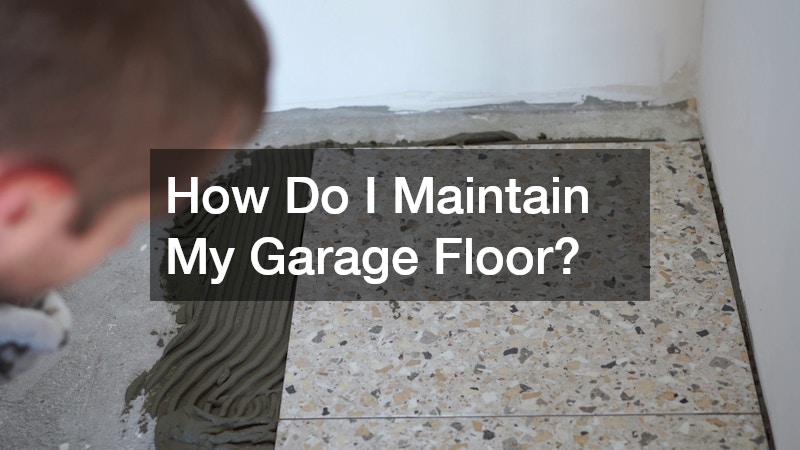
Daily Care Routines
Quick daily cleanups go a long way in maintaining your garage floor. Sweeping out dirt, leaves, and debris prevents scratches and keeps the surface safe and attractive. Using a microfiber mop or dust mop helps remove finer particles without damaging the finish, especially if you have epoxy floor coatings. Avoid using harsh chemicals or abrasive tools, as these can degrade the floor’s protective layer. Consistent daily care minimizes long-term wear and preserves the floor’s appearance.
Annual Deep Cleaning Strategies
Once a year, remove everything from the garage for a thorough deep clean. Use a degreasing agent specifically designed for garage floors to tackle stubborn oil and grease stains. For epoxy floors or other garage floor coatings, choose a pH-neutral cleaner to maintain the surface’s gloss and prevent discoloration. Consider power washing if appropriate, but be cautious with pressure settings to avoid damaging the coating. Regular deep cleaning refreshes the floor and extends the lifespan of your garage flooring investment.
Protection Against Spills
Oil and chemical spills should be wiped up immediately to prevent permanent staining or surface damage. Using mats or drip trays under cars and workbenches helps catch leaks before they reach the floor. A local flooring store can recommend sealants or protective coatings that improve resistance to spills and simplify cleanup. Prompt attention and proper protection measures keep your garage floor looking new and reduce costly repairs.
Conclusion
Expert home improvement doesn’t always mean gutting your space and starting from scratch. Sometimes, the most valuable upgrades are about maintaining what you already have—and doing it well. Your garage door and floor take a daily beating, and both deserve attention if you want them to last for years.
By incorporating routine garage door maintenance, addressing repairs quickly, and exploring durable solutions like an epoxy floor, you’re protecting your investment and improving your home’s function. Whether you work with garage door companies or try your hand at DIY, being proactive pays off.

